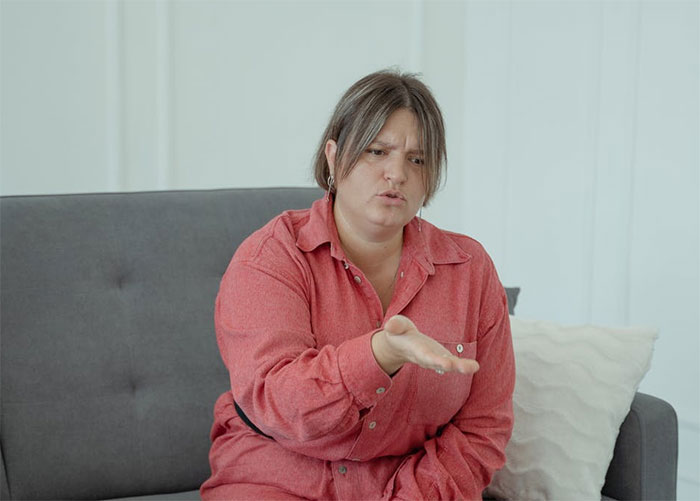
Couple Therapists Share The Most Common ‘Red Flags’ They Spot That Might Indicate The Relationship Is Problematic (30 Pics)
Being in a relationship is not a walk in the park. After the initial falling in love buzz and those sweet butterflies are over, the reality sets in. And couples have to find ways to navigate through their not-so-picture-perfect lives.
It may involve dirty dishes, piles of laundry, work stress echoing at the dinner table, arguments and constant what about yous, in-laws from hell, or more recently, quarantine-induced fatigue from everything, your partner included.
But sometimes, couples' relationships take a way more sinister turn, and this is what signals a red flag. Whether it’s co-dependency or inadequate control, some couple dynamics can be truly damaging.
So when someone asked couples’ therapists the question “without breaking confidentiality, what are some relationships that instantly set off red flags, and do you try and get them to work out?” the family experts weighed in on the sensitive topic. Their answers are in right below, and they’re more illuminating than you could think.

This post may include affiliate links.
 "We're staying together for the kids." It leads to an unhealthy mindset where the couple sees the children as a burden and believe that by remaining in an unhealthy relationship, it will somehow make the kids turn out alright. Kids are smarter than you think, and if mom and dad don't love each other, they'll pick up on it. If the kids are really the priority, either learn to fix the relationship, or end it.
"We're staying together for the kids." It leads to an unhealthy mindset where the couple sees the children as a burden and believe that by remaining in an unhealthy relationship, it will somehow make the kids turn out alright. Kids are smarter than you think, and if mom and dad don't love each other, they'll pick up on it. If the kids are really the priority, either learn to fix the relationship, or end it.
This needs to be higher. Children deserve better. Nobody needs a mentally broken family.
 When a partner raises objection to meeting with me individually. During the first session I share that during assessment I like to meet with them both together and once each individually. Occasionally I'll have partners who suddenly become very critical or suspicious about this. Asking why I'd do that, and is it ethical, and the classic "I've never heard of a marriage counselor doing that before?!" It goes beyond curiosity or simply inquiring about practice. There is an incredulous and almost panicked tone to it. And sure enough, Every. Single. Time. They turn out to be some variation of controlling, manipulative, abusive.
When a partner raises objection to meeting with me individually. During the first session I share that during assessment I like to meet with them both together and once each individually. Occasionally I'll have partners who suddenly become very critical or suspicious about this. Asking why I'd do that, and is it ethical, and the classic "I've never heard of a marriage counselor doing that before?!" It goes beyond curiosity or simply inquiring about practice. There is an incredulous and almost panicked tone to it. And sure enough, Every. Single. Time. They turn out to be some variation of controlling, manipulative, abusive.
 Control to an excessive amount. I most commonly see partners having to send pictures holding up a certain number of fingers or proving that it's a live picture. This is abuse.
Control to an excessive amount. I most commonly see partners having to send pictures holding up a certain number of fingers or proving that it's a live picture. This is abuse.
To find out what an expert has to say about navigating through the ups and downs of married life, Bored Panda contacted Dr. Lise Deguire, a clinical psychologist and author of “Flashback Girl: Lessons on Resilience From a Burn Survivor.”
When asked about critical red flags in relationships, Lise quoted John Gottman, a famous marriage researcher who identified what he calls "The Four Horsemen of the Apocalypse." “These Four Horsemen are actually four behaviors that indicate a marriage is in trouble and needs work. The 'four horsemen' of marital trouble are: criticism, defensiveness, contempt, and stonewalling."
However, Lise assured readers that many red flags can be solved with skilled intervention. “A wife may not realize that rolling her eyes and making a face at her husband qualifies as 'contempt' and is highly destructive to the marriage. A husband may not realize that his refusal to ever discuss his wife's feelings is stonewalling, and could bring about divorce if he doesn't learn new behaviors.”
 I’ll just say that if you find yourself screaming “I’m not f**king yelling at you,” you might have a communication problem.
I’ll just say that if you find yourself screaming “I’m not f**king yelling at you,” you might have a communication problem.
Overbearing parents and in laws. I understand there's a ton of cultural nuance here, and I work with couples who have arranged marriages, as well as the south Asian community. However, when a spouse is more allied with their parents and calls them on speakerphone for fights, or often speaks ill of their partner to their parents, I usually see these couples stay very unhappily married for years. It's sad.
Calling parents on speaker during argument? Well, that would be an embarrassment to all parties in my country (Finland).
 When one person is entirely dependent on the other, especially at a relatively young age. I mean financially and emotionally.
These are typically young women (sometimes young men as well) who do not work, do not have children, stay home all day and have no friends or hobbies outside of hanging out with their spouse. Very unhealthy, and a huge red flag. Always ends in a painful and messy breakup.
Generally, we try to get them to find a friend, join a community, get a job or volunteer - something to provide them with self worth and personal fulfillment outside of their spouse.
When one person is entirely dependent on the other, especially at a relatively young age. I mean financially and emotionally.
These are typically young women (sometimes young men as well) who do not work, do not have children, stay home all day and have no friends or hobbies outside of hanging out with their spouse. Very unhealthy, and a huge red flag. Always ends in a painful and messy breakup.
Generally, we try to get them to find a friend, join a community, get a job or volunteer - something to provide them with self worth and personal fulfillment outside of their spouse.
In order for a couple to heal, Lise said it’s vital to find a marriage therapist who specializes in marriage therapy and has advanced training in the area. “Marriage therapy is very hard to do well. But with a skilled therapist and a motivated couple who want the marriage to work, most marriages can be helped considerably.”
If partners are not on the same page, though, getting help may be complicated. Lise named a couple of signs that she, as a clinical psychologist, truly worries about.
“I worry about couples when neither of them seems to care about each other any more. I also worry about couples when only one of them desperately wants the marriage and the other never truly engages in marriage therapy. I worry about couples in which they continue to repeatedly lie to each other, because intimacy can not be reestablished without trust.”
On the other hand, Lise is positive that marriage therapy as a method of healing the relationship, when given a good clinician and a motivated couple, usually works quite well. “Most couples’ problems can be helped by learning better communication skills, and by having better insight into oneself and each other,” she concluded.
Active independence from each other is my #1 sign of “this marriage is about to spiral downward”. As soon as I realize a couple is doing things separately, like applying for car loan without the others knowledge, or planning personal trips without consulting the other, I know that the couple is soon doomed.
Boundary violations. Testing boundaries a little bit is ok but repeatedly violating boundaries is a big red flag. I work a lot with people who have left abusive relationships and often they doubt they ever will date again and eventually want to. We work on their personal boundaries but I also suggest some easy boundaries to have and how they can help. Boundary 1: maintain your routine. If you go to bed at 9pm and wake up to work out at 5am, maintain that. A decent person will respect that. A non-decent person will try to bulldoze through it. It might look like "awe stay up talking with me, I'm lonely", "its romantic to talk all night". If you aren't a teen, it isn't cute. It actually makes you too tired to be able be present and critically reflective of the relationship. If they are teasing and making fun of your routine, you probably dont have the same values. It isn't about who is right or wrong, you probably aren't on the same page. Boundary 2: (cultural trend here is to move in together within a month so might not apply elsewhere so much) for almost 6 months, dont get together more than 3-4times a week. This boundary helps you to preserve your "you-ness". It gives you time for your interests and friends. It very quickly flushes out insecurities or controlling behavior in a potential partner.
Wow I cannot imagine a place where moving in within a month is a good idea; you must have a lot of housing stock available to quickly (and somewhat affordably) move out again when things go wrong.
 Relationship therapist here.
One of the biggest red flags I see when working with a new couple is when they've totally forgotten the good. Part of relationship therapy is reconnecting a couple with what they like about each other, what initially attracted them to each other, and what the positives are between them.
When people come in and they've been so unhappy for so long that they actually can't remember what it was like to be in love, or to even like each other, they're just about hopeless.
You don't have to be happy for therapy to work--but if you can't even reminisce about the good times, then the good times are probably over.
Relationship therapist here.
One of the biggest red flags I see when working with a new couple is when they've totally forgotten the good. Part of relationship therapy is reconnecting a couple with what they like about each other, what initially attracted them to each other, and what the positives are between them.
When people come in and they've been so unhappy for so long that they actually can't remember what it was like to be in love, or to even like each other, they're just about hopeless.
You don't have to be happy for therapy to work--but if you can't even reminisce about the good times, then the good times are probably over.
THIS is one of the few answers that addresses the question. What’s a red flag that would cause a therapist to not want to help the couple stay together? This seems bad. Although I’m sure anything can be fixed, this is one thing I’ve always thought was just so horrible. One person can’t see, doesn’t remember or won’t be rational enough to remember the good. Hyper focus on the bad. That’s one of the most toxic things I can think of.
 People who approach therapy with the idea that they must convince the therapist that they’re right and their partner is wrong. Almost like they’re complaining to a parent or boss to have them sort out the problems.
People who approach therapy with the idea that they must convince the therapist that they’re right and their partner is wrong. Almost like they’re complaining to a parent or boss to have them sort out the problems.
this has to be so common. there are things that are really one partner doing something wrong(or perceived to be wrong) by the other partner and you feel like you need someone to tell you you're not crazy and it really is wrong. My husband won't fill the sugar bowl-he only fills it about 1.5" when he could put a week's worth in there(4" tall) and it drives me mad. He won't say why he does it this way and won't change how he does it. It's a weird quirk and it means it'll be me filling it up properly in a couple days time. I think it's passive aggressive and it's annoying af. He turns it into a joke if I bring it up. I wouldn't go to a councilor for it of course but it's annoying and he's not going to change.
 Couples in a tit for tat arrangement. For example: I cheated so you can have one night to cheat with whomever. Or I violated your trust and did drugs, you can go out and do whatever for one night. It erodes trust and compounds the hurt.
Couples in a tit for tat arrangement. For example: I cheated so you can have one night to cheat with whomever. Or I violated your trust and did drugs, you can go out and do whatever for one night. It erodes trust and compounds the hurt.
 When one spouse has a close relationship with a member of the opposite sex who doesn't like the other spouse. The old "He/She's just a friend." If it doesn't lead to cheating, it still will usually cause unneeded strain that will break apart the relationship.
When one spouse has a close relationship with a member of the opposite sex who doesn't like the other spouse. The old "He/She's just a friend." If it doesn't lead to cheating, it still will usually cause unneeded strain that will break apart the relationship.
 An unofficial litmus test is when I ask at some point in the first few sessions how the couple met.
If there is absolutely no positive effect from either person — no one even cracks a smile, or they just give me a single sentence answer ('We met at a party') — that's usually a signal they've been so unhappy so long, or the conflict is so overwhelming that they can't access those good warm fuzzy feelings from the beginning
An unofficial litmus test is when I ask at some point in the first few sessions how the couple met.
If there is absolutely no positive effect from either person — no one even cracks a smile, or they just give me a single sentence answer ('We met at a party') — that's usually a signal they've been so unhappy so long, or the conflict is so overwhelming that they can't access those good warm fuzzy feelings from the beginning
In my experience strong healthy relationships are built on two very important qualities: trust and respect. Love is not included in these qualities because love is not a determiner of a strong/healthy relationship. Dysfunctional relationships are still possible among people who love each other. And loving someone isn't the only reason to stay with a person. Many of the clients that I've worked with in the past who are in very dysfunctional relationships have actually stayed solely because of love, but continue to struggle in those relationships because they lack trust and respect. Without respect and trust most relationships are doomed to struggle or fail. For the couples that I've worked with I always assess for whether or not trust and respect is present. And then build treatment goals around seeing if it possible to develope those qualities. If they are not willing or able, then in most cases those relationships are likely to end.
 Contempt. When I experience true contempt from one in the relationship I know it is usually over. Look towards a peaceful ending at that point if possible.
Contempt. When I experience true contempt from one in the relationship I know it is usually over. Look towards a peaceful ending at that point if possible.
My wife and I (separated now) went to couples counseling where it was a husband-wife counseling team. I thought that would be great, since it may help us open up more having a member of both sexes there. My wife was hesitant about couples counseling, but agreed to try it. We had our initial session together and it was cold and difficult (as expected), and my wife said she still wanted to leave, but they convinced her to try a few more sessions to see if anything clicked as we opened up. We had an individual session the next time, and I thought it went fantastically. I gained a completely different understanding of intimacy (not sexual, but emotional and relational) and I was jazzed to start working at putting it into practice. My wife came out with tear stains and sat in her car crying before she finally left for home. (We drove separately because she was coming from work and I from home). Our next appointment was another individual session. The male counselor and I were talking again, and he started digging into my expectations and desires in the relationship, what I loved about wife, etc. He point-blank asked me "Do you feel wife is a good match for you in life, and that you want to continue this relationship" and I was a little off-put, but figured yeah it's probably a good thing to establish that right off the bat, so I answered emphatically yes, and he just looked heartbroken and so very sad. I knew pretty well right then that we were toast. Wife admitted her affair the day before our next session and left.
When I see a couple in which one or both of the members are seeking to change something fundamental about the other person. We process where the need for the change comes from and the person with the issue evaluates whether it's a dealbreaker for them or not. We work on acceptance and tolerance of others. I also recommend my couples are also in individual therapy on their own.
In premarital counseling, when the couple states that they're saving themselves for their wedding night, and then one or both confides privately that they're not a virgin and the other has no idea. In broader terms, when a couple isn't honest with each other about their sexual history. So many reasons that's unhealthy, I can't even begin to list them all, but the biggest is that honesty is the most solid foundation on which to build a relationship. If you're afraid of what your partner will think, ask yourself if you want to deal with in now or later. Deal with it now
I wish we could just do away with the whole "virginity" concept. There is no membrane that just breaks when a woman has sex for the first time. Period blood has to glow through someplace after all.
Constant, needless escalation. When "I dont think we need this expensive thing" is escalated to "you don't really love me" - major problem. It shows up quickly in therapy if you're watching for it. Mostly because the one using this to avoid accountability is almost guaranteed to play this card in relation to therapy itself, either "I had to drag them here" or "they're just trying to break up with me" What they're doing is avoiding conversation about the issue by blowing it up into a bigger problem then it is, so they can make the other person respond to their feelings rather than dealing with their concerns.
I was just talking about this case today. Years ago when I was starting out I had a female client come in and she reported anxiety, depression, etc because her ex husband was bothering her. I thought that was completely average and normal, so I asked her about it. She recounted many times that her and the ex clashed. I said, you know, you don't have to interact with him and maybe just distancing yourself is the way to go. Then she told me that they still lived together and had no plans of moving... The red flag, indicted I was dealing with two crazy people.
Active physical abuse and each person admitting it and trying to be OK with it.
Invalidation. This comes in many forms, from gaslighting to just simple denial of another's opinion. Most of the time, one or both parties are simply trying to be heard on an emotional level with an event or topic that was brought up, but the other party takes this as a personal attack on their ideals. We've all heard of or know people who will literally disagree with anything you say simply because you said it. That's the invalidation I'm referring to. Attack the problem, not each other. People rarely have the exact same stance in a conflict, but they usually (in healthy relationships) have very similar core values. While two parents may disagree on how to parent a child (authoritarian vs authoritative for example), the core value of caring about their children and wanting them to succeed is often the same. By determining they are within the same realm of issue, two parents with different ideals can see themselves as allies in a conflict rather than enemies.
My ex bf was like this. Took me way to long to end that relationship (finally did when I turned 30) - best thing I've ever done. And even afterwards I struggled with voicing my honest opinion about things out of fear of being invalidated. Today I'm happily engaged and it still boggles me, how this ever happened to me.
One of the big red flags I look for, is metaconversation. Example to use for sake of discussion : partner 1 is mad that partner 2 doesn't help out at home more. There are always two levels of communication, one is the direct message intended (please clean up the dishes) and the second is communication about the communication (I expect you to do what I ask). When communication about the communication turns meta the message gets muddled and a power struggle erupts from misunderstandings. Tone, body language, and the way one responds to the request... All become the focal point. If the arguments don't fall into meta arguments, then thats a sign the couple has a strong foundation, and the work is usually about exploring expectations of the relationship or readjusting roles. If they fall into meta arguments, it's a sign the couple needs to build up their foundation which will likely lead to them able to adjust the roles themselves once that happens. Two different approaches, same base issue at hand.
 Name calling in session and when I intervene they both get mad at me.
Name calling in session and when I intervene they both get mad at me.
"High-conflict relationships." If frequent and bitter conflict began a few months (or less) after the relationship began, and continued, relationship therapy is going to be a sh*tshow, won't be helpful. Either the conflict will continue indefinitely, or come to an end. Not just my opinion. The research supports this.
Damn, this one hit the nail on the head for me. I've noticed it usually takes 3-6 months for a romantic partner's true colors to come out. I dated a wonderful charming guy but at the 1 month mark all hell broke loose and his psychopathic behavior came out. People who are abusive or manipulative cannot keep the pretense of normalcy up for very long. I'm glad I got out alive.
 An affair that won't end. I've never seen a relationship bounce back where a partner is still in contact with their gf/bf (I don't mean an ex gf/bf, I mean the person x is having the affair with), or is lying about it.
An affair that won't end. I've never seen a relationship bounce back where a partner is still in contact with their gf/bf (I don't mean an ex gf/bf, I mean the person x is having the affair with), or is lying about it.
Not sure these people in the picture agreed to be linked to this topic. In fact, lose all the pictures so it's more readable, the images add colours and nothing else.
Am a therapist, newer to couples counseling, but one of the flags I've seen is one person digging their heels in and not accepting any feedback or suggestions, then that person tells me and partner that they are "trying." I called him out on it, said that he needed to evaluate what he's willing to do and NOT do. Needless to say didn't hear back from them. Another weird one is separating without a plan. All that's gonna do is teach you how to live without each other IMO. I would ask them "ok, how do you know when the separation works?" "I dunno, when I start missing them I guess" is what I typically hear.
Saying, directly to each other, “I don’t love you. I am just here to try and like you enough to stay together”. And the other person replaying with “good. We can do that”.
What-aboutism. Instead of taking ownership and responsibility for their contribution to the degradation of the relationship one or both parties simply point out an example of the other exhibiting a similar behavior. It's a red flag because it illustrates their lack of self awareness and poor communication skills. Communication is key when trying to mend a tattered relationship because without respectful communication the conflict-recovery process can never begin. In the conflict-recovery model both parties agree to the terms under which they will communicate (no yelling, no interrupting, no I told you so's... Etc). Each party gets a chance to share how the others actions make them feel. Then they each propose their solutions and identify where they made assumptions or where they got triggered and why. Then they identify where they're willing to compromise. Next we create an actionable plan with deadlines and we monitor the progress to see if the proposed solutions were effective. IMO everything can go to sh*t, but once communication stagnates you're in real trouble. So even if youre arguing you're still doing ok, you just need to work on how you're communicating
If you recognize that the other person's behaviour, that is similar to yours, is unacceptable, then it's unacceptable when you do it too. Also, just because your partner is worse, does not make your behaviour right.
It's very easy to work out when one person knowingly prioritises their own wants and needs over their partners. Relationships like this are often doomed because the person simply doesn't care enough to make any meaningful change.
I saw a couple that was doing "retaliatory" cheating (and telling each other about it). When they got through their anger, they decided to call a truce and made peace. With their level of emotional maturity, I doubt it lasted. I don't know if I helped them or prolonged their suffering. It was their decision to come to counseling, so I think it was the help they wanted.
Very Darth Vader, "I am helping you; pray that I don't help you any further".
Partners refusing to listen. Absolutely deafening themselves to certain explicit statement.
Hm... that ... sounds familiar. It's like the other person never said anything at all...
Complete disrespect and true contempt with each other. Yet refusing to accept their relationship is over
Spouses who don't sleep together without a justifiable reason. As in, not due to work conflicts or medical reasons, but because one spouse just doesn't feel like going to bed alongside the other. Lack of intimacy, both sexual and non-sexual, will lead to the two drifting apart.
My husband and I didn't sleep together for a couple of years, but it's because his snoring rivals heavy machinery in decibels.
Good question! I doubt i have much to add that others haven't already said but the biggest one i notice is respect. Respecting space, boundaries, feelings, interests, relationships are all so important and lack of respect by either person for the other is going to mean big problems. I would definitely try to help them work through it but it's hard to point out to someone that something they are doing is hurting the other. Which leads to my second red flag, lack of communication lol
 One partner says they’re seeking your services to help them determine if they want to stay together; the other partner says they’re seeking your services to make it so they stay together.
Then it’s about highlighting the points and allowing the person who is on the fence decide what they want, since the other person knows.
One partner says they’re seeking your services to help them determine if they want to stay together; the other partner says they’re seeking your services to make it so they stay together.
Then it’s about highlighting the points and allowing the person who is on the fence decide what they want, since the other person knows.
If the relationship is hard, exhausting, and if you are suffering in the first months or years, when it should be the best, the happiest time, it will never get better. It will get worse. He will NOT realize how much you love him and how much he will miss you and how much you invested in this relationship. Hard relationships, where you suffer and where you are alone most of time, will never get better. You will just lose the best years or decades of your life and feel severe depression and loss of yourself. If he can't make it be at least effortless in the beginning it will just get worse.
Here is the basic bottom line. Respect each other. Even when arguing, no name calling. Be willing to communicate about anything. Trouble starts when you stop talking. Keep the communication lines open. Do not belittle or bring up the past just to hurt the other person. If the past is not relevant to the present, it's best forgotten. Learn to forgive. People make stupid mistakes sometimes. Should you endure cheating or abuse? Certainly not. But people are human and not perfect. Always remember the happy times and learn to laugh with each other. Creating more good times than bad makes the bad times less relevant. And number one rule...just be there for each other..emotionally and/or physically. A hug and/or kiss can go a long way to healing pain or providing comfort.
You're SO right. Respect is key. And communication. Laughing together is so important, don't lose that.
Load More Replies...Here's a very common one that it seems everyone takes for granted: When one person practically dictates to the other what they have to do, often using passive aggressive methods. E.g. if they're going out and A tells B what they should wear and what they can't wear/ saying to them that they can go out with their friends then being controlling and dictating when they have to come back. These are forms of emotional abuse and manipulation, but we've all heard these kinds of things many times.
Had a friend like that whose husband wanted her to only wear pink because she was fair skinned with red hair. She bought her own clothes and he was always criticizing anything that was not pink.. The icing on the cake was when she came home from work one day to find out that he'd thrown all of her non-pink clothes in the trash. During the divorce, she turned to him at one point and said..."I'm a person..not an object for you to own. If you want someone you can always dress in pink..go buy yourself a Barbie doll!"
Load More Replies...If the relationship is hard, exhausting, and if you are suffering in the first months or years, when it should be the best, the happiest time, it will never get better. It will get worse. He will NOT realize how much you love him and how much he will miss you and how much you invested in this relationship. Hard relationships, where you suffer and where you are alone most of time, will never get better. You will just lose the best years or decades of your life and feel severe depression and loss of yourself. If he can't make it be at least effortless in the beginning it will just get worse.
Here is the basic bottom line. Respect each other. Even when arguing, no name calling. Be willing to communicate about anything. Trouble starts when you stop talking. Keep the communication lines open. Do not belittle or bring up the past just to hurt the other person. If the past is not relevant to the present, it's best forgotten. Learn to forgive. People make stupid mistakes sometimes. Should you endure cheating or abuse? Certainly not. But people are human and not perfect. Always remember the happy times and learn to laugh with each other. Creating more good times than bad makes the bad times less relevant. And number one rule...just be there for each other..emotionally and/or physically. A hug and/or kiss can go a long way to healing pain or providing comfort.
You're SO right. Respect is key. And communication. Laughing together is so important, don't lose that.
Load More Replies...Here's a very common one that it seems everyone takes for granted: When one person practically dictates to the other what they have to do, often using passive aggressive methods. E.g. if they're going out and A tells B what they should wear and what they can't wear/ saying to them that they can go out with their friends then being controlling and dictating when they have to come back. These are forms of emotional abuse and manipulation, but we've all heard these kinds of things many times.
Had a friend like that whose husband wanted her to only wear pink because she was fair skinned with red hair. She bought her own clothes and he was always criticizing anything that was not pink.. The icing on the cake was when she came home from work one day to find out that he'd thrown all of her non-pink clothes in the trash. During the divorce, she turned to him at one point and said..."I'm a person..not an object for you to own. If you want someone you can always dress in pink..go buy yourself a Barbie doll!"
Load More Replies...
 Dark Mode
Dark Mode 

 No fees, cancel anytime
No fees, cancel anytime 













































































